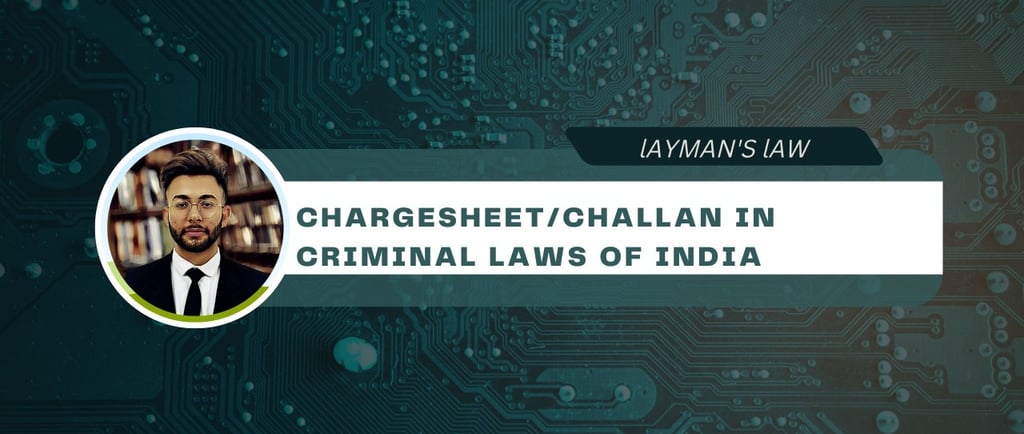Charge sheet, Cancellation Report, and Protest Petition
LAYMAN'S LAW
Utkarsh R. Madaan, Advocate and Certified Mediators
6/22/20243 min read


Chargesheet/Challan in Criminal Laws of India
In the realm of criminal laws in India, a chargesheet or challan holds significant importance. It is a comprehensive report submitted by the investigating agency (usually the police) to the court after the completion of an investigation. The chargesheet contains the findings, evidence, and statements gathered during the investigation, outlining the alleged criminal offenses committed by the accused.
Once the chargesheet is filed, it signifies that the investigating agency believes there is enough evidence to proceed with the case. The chargesheet acts as a basis for the court to take cognizance of the offense and initiate legal proceedings against the accused.
What is a Cancellation Report?
Sometimes, after completing the investigation, the police may submit a report to the court requesting the cancellation of the case. This report is known as a cancellation report and is filed when the police believe that no offense appears to have been committed. It is essential to note that the police must inform the complainant when such a cancellation report is going to be submitted to the court.
Upon receiving a notice from the court about the cancellation report, the victim or complainant has an opportunity to provide their input on the matter. They can express their satisfaction or dissatisfaction with the investigation conducted by the police. This information assists the court in making an informed decision regarding the acceptance or rejection of the final report.
What Can Be Done After Chargesheet Has Been Filed?
Once the chargesheet has been filed, several legal avenues are available for both the prosecution and the defense. The court, upon reviewing the chargesheet, has three options. Firstly, it can accept the chargesheet, take cognizance of the offense, and issue the necessary legal process. Secondly, the court can disagree with the chargesheet and drop the proceedings. Lastly, the court may direct further investigation by another agency or investigating officer, depending on the circumstances and evidence presented.
Remedy Against Cancellation Report
In the event that a cancellation report is filed by the police, the complainant is entitled to certain rights. The court is required to issue notices to the complainant, notifying them about the cancellation report. The complainant then has the right to file a protest petition and present arguments in support of their position. Subsequently, the court has three options at its disposal: accepting the cancellation report and dropping the proceedings, directing further investigation by the police, or disagreeing with the report and proceeding with the case.
It is important to note that while the magistrate has the power to take cognizance of an offense even if the police report indicates otherwise, the magistrate cannot direct the investigating agency or police to file a challan (charge sheet) in court. The investigating agency retains the authority to determine whether the material collected during the investigation warrants initiating trial proceedings before the magistrate.
Protest Petition
A protest petition is a legal mechanism through which a complainant can challenge a cancellation report or any decision made by the court that they disagree with. It allows the complainant to present their arguments, evidence, and concerns to the court, seeking a different course of action. The court will consider the protest petition and make a decision based on the merits of the arguments presented.
Remember, when you receive notice from the court regarding a cancellation report, it is crucial to provide all relevant information and express any dissatisfaction with the investigation. By actively participating in the legal process and bringing important facts to the court's attention, you play a vital role in ensuring a fair and just outcome.
Feeling confused about Charge sheet and the laws surrounding them? No need to worry! I'm here to help. Feel free to contact me using the details below for free advice and assistance on the contact details given below.
Also, don't forget to read our previous articles on:

